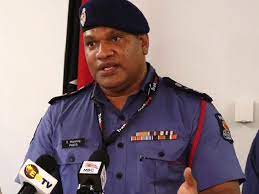No legal immunity will be granted to people found guilty of crimes related to the 18 February massacre in Enga, Papua New Guinea Police commissioner David Manning says.
“People need to be held accountable. Our intent is to resolve and take serious actions and interventions towards ending the conflict,” Manning said.
He was speaking in reference to a weekend-long roundtable discussions involving leaders from warring tribes, national and provincial government officers and mediators and police.
The conferencing started on Friday and ended Sunday in Port Moresby.
The closed-door weekend meeting was initiated by the Enga government.
Provincial administrator Sandis Tsaka said the forum brought together 120-odd delegates from the Yopo Alliance comprising six tribes, Palinau Alliance composing of nine tribes and representatives of the 19 impacted tribes and communities.
Stressing on the rule of law, Tsaka said the dynamics of fighting in the Highlands, and in Enga, had changed.
“The proliferation of high-powered weapons, in the hands of criminals, is at an unprecedented level,” he said.
“The traditional rules of engagement have changed.”
Tsaka and Manning, in separate reports, stressed on the need for sustained peace in the conflict areas.
Manning said any peace resolution “does not give room for legal immunity for people guilty of committing serious crimes during the conflicts”.
He said the Feb 18 massacre had prompted police to revisit its responses to conflicts such as tribal fights.
Manning said many steps had been taken in the past to find middle ground in resolving these long-standing conflicts, but it was obvious that “there has to be a complete review of what we do in terms of government intervention”.
Tsaka told police and Engan clan leaders at Port Moresby’s Hilton Hotel that traditionally, tribal fights were resolved on the ground in Enga.
“The level of devastation and disruption due to tribal conflicts has changed.”
He said in this particular case, at least eight preventive orders were issued against further confrontation, but to no avail.
“Traditional methods of law enforcement and conflict resolution were failing.”
The Palinau Alliance met with the government mediators on Friday, followed by the Yopo Alliance on Saturday.
All parties came together Sunday.
Manning said it was important to identify and sustain any conflict resolution efforts.
“Our intent is to resolve and take serious actions and interventions towards ending the conflict,” Manning said.
“It does not give us any room to grant legal immunity for those who we have evidence of committing serious crimes during the conflicts.”
On the outcomes reached, he said they have agreed to two specific lines of operation.
One is to deal with the conflict itself, understanding the conflict and addressing those issues that gave rise to those conflicts.
“We are interested in the possibility to see peaceful arms surrender as part of the resolution.”
“Second is humanitarian relief that needs to be done.
“We’ve always had to go in and deal with the conflict itself with limited success.
But we always forget those vulnerable groups that have been affected.”
The Yopo Alliance is made up of the Yopo, Ambulin, Lungipin, Sau, Itokon Nenai and Yandamau tribes.
The Palinau Alliance includes tribes from Palinau, Kaekin, Itokon Mupapalu, Sakaikin, Sikin, Lyona, Wapunkin, Murap and Lanzerakin.














